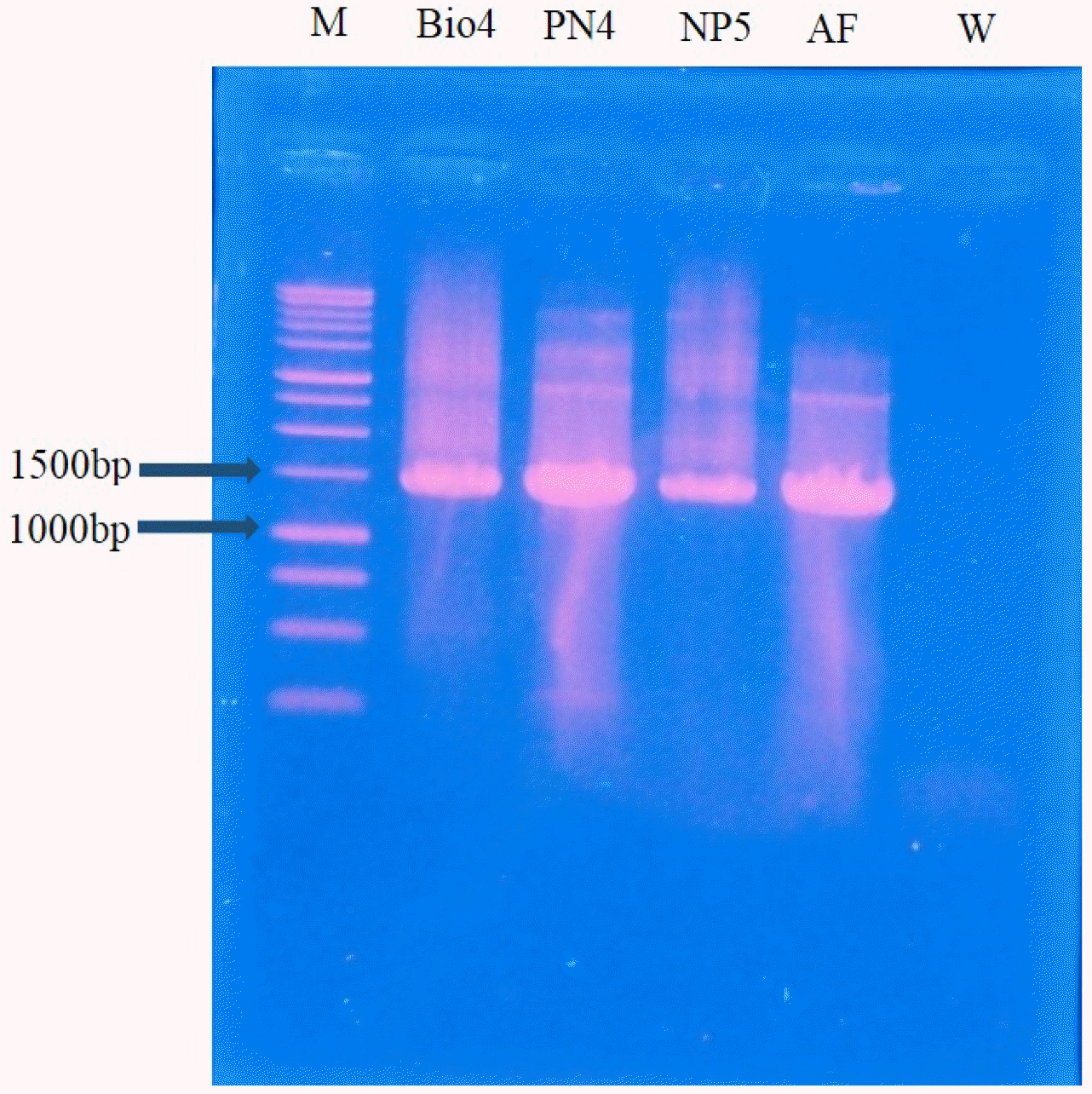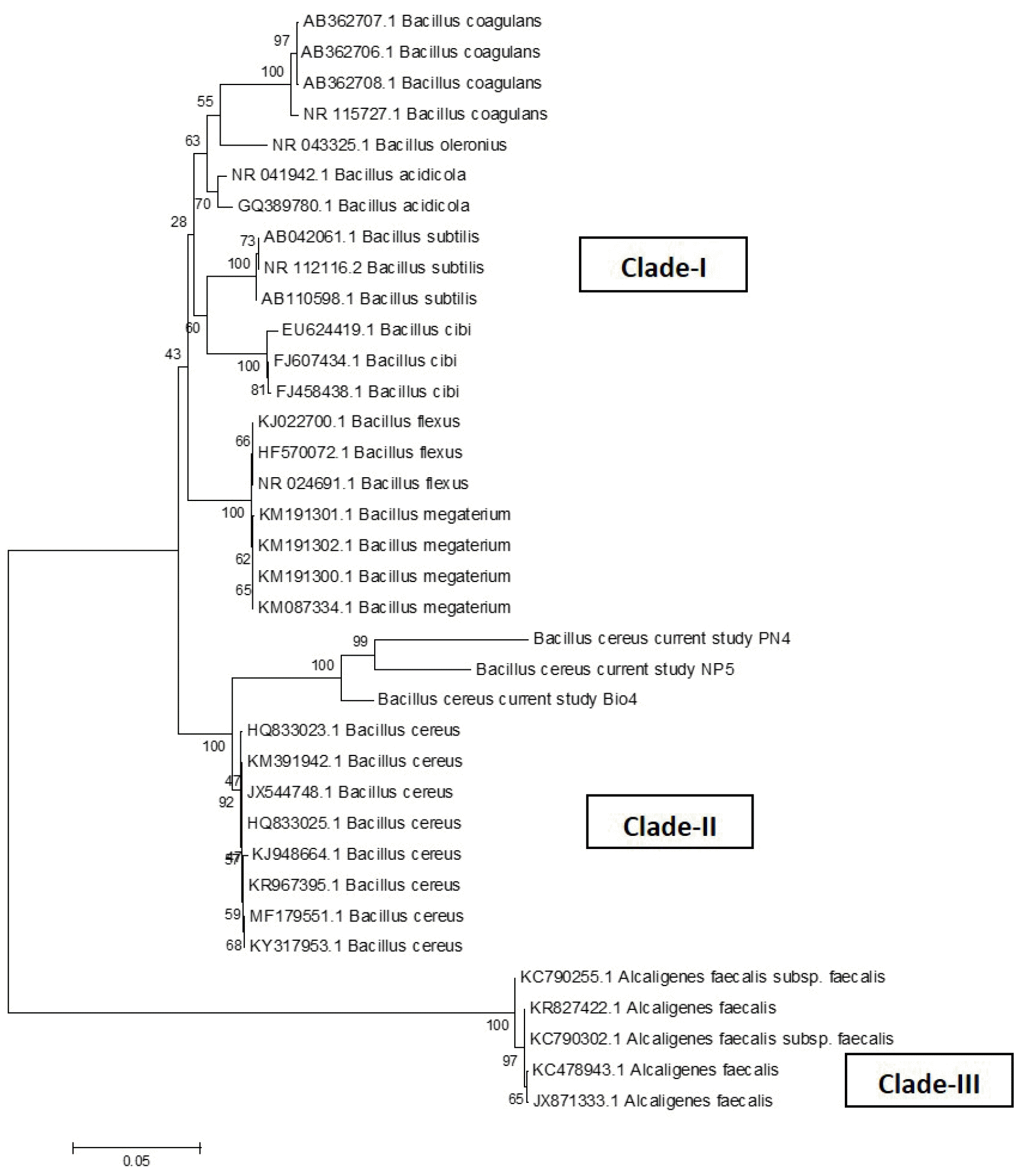1. Hernández-Cortez C, Palma-Martínez I, Gonzalez-Avila LU, Guerrero-Mandujano A, Solís RC, Castro-Escarpulli G.
Food poisoning caused by bacteria (food toxins). In: Poisoning-From specific toxic agents to novel rapid and simplified techniques for analysis.
IntechOpen. 2017;33.DOI:
10.5772/intechopen.69953. PMID:
28421662.
2. Sagripanti JL, Carrera M, Insalaco J, Ziemski M, Rogers J, Zandomeni R. Virulent spores of Bacillus anthracis and other Bacillus species deposited on solid surfaces have similar sensitivity to chemical decontaminants.
J Appl Microbiol. 2007;102(1):11-21.DOI:
10.1111/j.1365-2672.2006.03235.x. PMID:
17184315.
3. Frazier WC, Westhoff DC. Food Microbiology, 3rd Ed. New York: McGraw-Hill Book; 1978. p. 472.
4. Jackson SG, Goodbrand RB, Ahmed R, Kasatiya S.
Bacillus cereus and
Bacillus thuringiensis isolated in a gastroenteritis outbreak investigation.
Lett Appl Microbiol. 1995;21(2):103-105.DOI:
10.1111/j.1472-765X.1995.tb01017.x. PMID:
7639990.
6. Stewart GC. Staphylococcus aureus. In Foodborne pathogens: Microbiology and Molecular Biology; Fratamico PM, Bhunia AK, Smith JL, Eds. UK; Caister Academic Press Norfolk; 2005. p. 273-284.
7. Ryu JH, Beuchat LR. Biofilm formation and sporulation by Bacillus cereus on a stainless steel surface and subsequent resistance of vegetative cells and spores to chlorine, chlorine dioxide, and a peroxyacetic acid-based sanitizer.
J Food Prot. 2005;68(12):2614-2622.DOI:
10.4315/0362-028X-68.12.2614. PMID:
16355833.
9. Schmitt N, Bowmer EJ, Willoughby BA. Food poisoning outbreak attributed to Bacillus cereus. Can J Public Health. 1976;67(5):418-422.
11. Pal M, Asefa M, Deressa A, Muzein R. Processed foods and Bacillus Cereus poisoning. Beverage Food World. 2014;41:41-43.
12. Nicholls M, Purcell B, Willis C, Amar CF, Kanagarajah S, Chamberlain D, et al. Investigation of an outbreak of vomiting in nurseries in South East England, May 2012.
Epidemiol Infect. 2016;144(3):582-590.DOI:
10.1017/S0950268815001491. PMID:
26165194.
13. Schmid D, Rademacher C, Kanitz EE, Frenzel E, Simons E, Allerberger F, et al. Elucidation of enterotoxigenic Bacillus cereus outbreaks in Austria by complementary epidemiological and microbiological investigations, 2013.
Int J Food Microbiol. 2016;232:80-86.DOI:
10.1016/j.ijfoodmicro.2016.05.011. PMID:
27257745.
14. Glasset B, Herbin S, Guillier L, Cadel-Six S, Vignaud ML, Grout J, et al.
Bacillus cereus-induced food-borne outbreaks in France, 2007 to 2014: epidemiology and genetic characterization.
Euro Surveill. 2016;21(48):30413.DOI:
10.2807/1560-7917.ES.2016.21.48.30413. PMID:
27934583. PMCID:
PMC5388111.
15. Delbrassinne L, Botteldoorn N, Andjelkovic M, Dierick K, Denayer S. An emetic Bacillus cereus outbreak in a kindergarten: detection and quantification of critical levels of cereulide toxin.
Foodborne Patho Dis. 2015;12(1):84-87.DOI:
10.1089/fpd.2014.1788. PMID:
25457101.
16. Doménech-Sánchez A, Laso E, Pérez MJ, Berrocal CI. Emetic disease caused by Bacillus cereus after consumption of tuna fish in a beach club.
Foodborne Patho Dis. 2011;8(7):835-837.DOI:
10.1089/fpd.2010.0783. PMID:
21381943.
17. López AC, Minnaard J, Pérez PF, Alippi AM. A case of intoxication due to a highly cytotoxic Bacillus cereus strain isolated from cooked chicken.
Food Microbiol. 2015;46:195-199.DOI:
10.1016/j.fm.2014.08.005. PMID:
25475284.
18. Sloan-Gardner TS, Glynn-Robinson AJ, Roberts-Witteveen A, Krsteski R, Rogers K, Kaye A, et al. An outbreak of gastroenteritis linked to a buffet lunch served at a Canberra restaurant. Commun Dis Intell Q Rep. 2014;38(4):E273-278.
19. Logan NA, Rodríguez‐Díaz M.
Bacillus spp. and related genera. Principal Practice Clin Bacteriol. John Wiley & Sons, Ltd; 2006. p.139-158.DOI:
10.1002/9780470017968.ch9.
20. Ahmed AA, Moustafa MK, Marth EH. Incidence of Bacillus cereus in milk and some milk products.
J Food Prot. 1983;46(2):126-128.DOI:
10.4315/0362-028X-46.2.126. PMID:
30913599.
21. Kotiranta A, Lounatmaa K, Haapasalo M. Epidemiology and pathogenesis of
Bacillus cereus infections.
Microbes Infect. 2000;2(2):189-198.DOI:
10.1016/S1286-4579(00)00269-0. PMID:
10742691.
22. CAC/RCP 66. Code of hygienic practice for powdered formulae for infants and young children. Italy: Joint FAO. WHO Food Standards Programme; 2008. p.1-29.
23. Te Giffel MC, Beumer RR, Granum PE, Rombouts FM. Isolation and characterisation of
Bacillus cereus from pasteurised milk in household refrigerators in the Netherlands.
Int J Food Microbiol. 1997;34(3):307-318.DOI:
10.1016/S0168-1605(96)01204-4. PMID:
9039575.
24. Barkley M, Delaney P. An occurrence of bitty cream in Australian pasteurized milk. Neth Milk Dairy J. 1980;J3(4):191-198.
25. Harmon SM, Kautter DA. Incidence and growth potential of Bacillus cereus in ready-to-serve foods.
J Food Prot. 1991;
54(5):372-374.DOI:
10.4315/0362-028X-54.5.372. PMID:
31051554.
26. Sarrıas JA, Valero M, Salmerón MC. Enumeration, isolation and characterization of Bacillus cereus strains from Spanish raw rice.
Food Microbiol. 2002;19(6):589-595.DOI:
10.1006/fmic.2002.0514.
27. Meysenburg R, Albrecht JA, Litchfield R, Ritter-Gooder PK. Food safety knowledge, practices, and beliefs of primary food preparers in families with young children. A mixed methods study.
Appetite. 2014;73:121-131.DOI:
10.1016/j.appet.2013.10.015. PMID:
24211815.
28. Friedman ND, Temkin E, Carmeli Y. The negative impact of antibiotic resistance.
Clin Microbiol Infect. 2016;22(5):416-422.DOI:
10.1016/j.cmi.2015.12.002. PMID:
26706614.
29. Rang HP, Dale MM, Ritter JM, Moore PK. Pharmacology. 5th Ed. Edinburgh: Churchill Livingstone; 2003. p. 490-502.
30. World Health Organization. Food safety and foodborne illness. Fact sheet no. 237. Geneva: World Health Organization; 2007.DOI:
10.1080/04419057.2007.9674516.
31. Afrin N, Shilpi RY. First report of
Bacillus marisflavi as a potential pectinase producing bacteria from samples of savar, Dhaka.
Bangladesh J Bot. 2023;52(1):159-163.DOI:
10.3329/bjb.v52i1.65246.
32. Kumari S, Sarkar PK. In vitro model study for biofilm formation by Bacillus cereus in dairy chilling tanks and optimization of clean-in-place (CIP) regimes using response surface methodology.
Food Control. 2014;36(1):153-158.DOI:
10.1016/j.foodcont.2013.08.014.
33. Tamura K, Nei M, Kumar S. Prospects for inferring very large phylogenies by using the neighbor-joining method.
Proc Nat Acad Sci U S A. 2004;101(30):11030-11035.DOI:
10.1073/pnas.0404206101. PMID:
15258291. PMCID:
PMC491989.
34. Yu P, Yu S, Wang J, Guo H, Zhang Y, Liao X, et al.
Bacillus cereus isolated from vegetables in China: incidence, genetic diversity, virulence genes, and antimicrobial resistance.
Front Microbiol. 2019;10:948.DOI:
10.3389/fmicb.2019.00948. PMID:
31156567. PMCID:
PMC6530634.
35. Clinical and Laboratory Standards Institute. (CLSI). Reference method for broth dilution antifungal susceptibility testing of yeasts. Approved Standard-Third Edition M27-A3. 2008;28(14).
37. Panel members. Opinion of the scientific panel on biological hazards on Bacillus cereus and other Bacillus spp. in foodstuffs. EFSA J. 2005;175:1-48.
38. Kulshreshthra SB. Annual report Div Publ Hlth IVRI, Izatnaga, Cited by Singh CM (1979) in problems of foodborne infection and intoxications & their working preposition in South East Assi. WHO Inter Country Workshop on Advanced Microbiological Methods in food Hygiene Compendium. Izatnagar. 1978;1:15-55.
39. Rahimi E, Abdos F, Momtaz H, Baghbadorani ZT, Jalali M. Bacillus cereus in infant foods: prevalence study and distribution of enterotoxigenic virulence factors in Isfahan Province, Iran.
Scientific World Journal. 2013;2013:292571.DOI:
10.1155/2013/292571. PMID:
23781153. PMCID:
PMC3678457.
40. Yu R, Cao H, Huang Y, Peng M, Kajbaf K, Kumar V, et al. The effects of partial replacement of fishmeal protein by hydrolysed feather meal protein in the diet with high inclusion of plant protein on growth performance, fillet quality, and physiological parameters of Pengze crucian carp (Carassius auratus var. Pengze).
Aquacult Res. 2020;51(2):636-647.DOI:
10.1111/are.14411.
41. Zhao S, Chen J, Fei P, Feng H, Wang Y, Ali MA, et al. Prevalence, molecular characterization, and antibiotic susceptibility of Bacillus cereus isolated from dairy products in China.
J Dairy Sci. 2020;103(5):3994-4001.DOI:
10.3168/jds.2019-17541. PMID:
32113767.
43. Park JH, Lee YD, Ryu TW, Chang HI. Identification and classification of Cronobacter spp. isolated from powdered food in Korea. J Microbiol Biotechnol. 2010;20(4):757-762.
44. Schlegelova J, Babak V, Holasova M, Konstantinova L, Necidova L, Šišák F, et al. Microbial contamination after sanitation of food contact surfaces in dairy and meat processing plants.
Czech J Food Sci. 2010;28(5):450-461.DOI:
10.17221/65/2009-CJFS.
45. Salustiano VC, Andrade NJ, Soares NFF, Lima JC, Bernardes PC, Luiz LMP, et al. Contamination of milk with Bacillus cereus by post-pasteurization surface exposure as evaluated by automated ribotyping.
Food Control. 2009;20(4):439-442.DOI:
10.1016/j.foodcont.2008.07.004.
46. Didouh N, Bendimered N, Postellec F, Deperieux E, Leguerinel I, BoudjemâA BM. Effect of hydrophobic or hydrophilic characteristics of
B. cereus spores on their resistance to detergents.
J Food Prot. 2022;85(4):706-711.DOI:
10.4315/JFP-21-286. PMID:
35113985.
47. Shadlia-Matug M, Aidoo KE, Candlish AA, Elgerbi AM. Evaluation of some antibiotics against pathogenic bacteria isolated from infant foods in North Africa.
Open Food Sci J. 2008;2:95-101.DOI:
10.2174/1874256400802010095.
48. Chen LD, Daniel RM, Coolbear T. Detection and impact of protease and lipase activities in milk and milk powders.
Int Dairy J. 2003;13(4):255-275.DOI:
10.1016/S0958-6946(02)00171-1.
49. Kiessling CR, Cutting JH, Loftis M, Kiessling WM, Datta AR, Sofos JN. Antimicrobial resistance of food-related Salmonella isolates, 1999-2000.
J Food Prot. 2002;65(4):603-608.DOI:
10.4315/0362-028X-65.4.603. PMID:
11952207.
50. Brodie EL, DeSantis TZ, Joyner DC, Baek SM, Larsen JT, Andersen GL, et al. Application of a high-density oligonucleotide microarray approach to study bacterial population dynamics during uranium reduction and reoxidation.
Appl Environ Microbiol. 2006;72(9):6288-6298.DOI:
10.1128/AEM.00246-06. PMID:
16957256. PMCID:
PMC1563607.




 PDF
PDF Citation
Citation Print
Print




 XML Download
XML Download